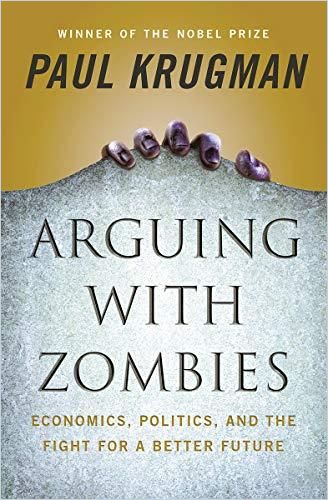Nobel Prize-winning columnist Paul Krugman covers the economic events of the 21st century so far.

Comprehensible Economics
Nobel Prize-winning economist Paul Krugman, a professor at the City University of New York, is also a columnist for The New York Times. In this bestselling collection of his essays on an array of topics, Krugman skewers the “zombies” who make false or misleading claims about the economy.
In 21st-century America…accepting what the evidence says about an economic question will be seen as a partisan act.Paul Krugman
The Washington Post called this “a revelation [that] showcases Krugman’s intelligence and gift for clear, accessible writing.” The Atlantic, however, raised an intriguing question: “How [did] so talented and fortunate an author…develop such a furious and bitter voice?” The answer: Krugman, once an apolitical technocrat, “contends he didn’t change. Politics did.”
Social Security
President George W. Bush secured re-election mostly because of his image as a hero in his response to the September 11, 2001, attacks, Krugman claims. Bush sought to privatize Social Security, as elites charged it was on the cusp of economic collapse.
Very little of the privatizers’ position is honest. They came to bury Social Security, not to save it.Paul Krugman
But, Krugman points out, in 2004, Social Security’s trustees said that the system was financially stable and that minor investments would keep it steady for 75 years. The privatization of Social Security did not happen, Krugman celebrates, because the American people opposed it.
Obamacare Succeeded
Krugman notes that, in 2009 and 2010, Democrats, who then controlled both houses of Congress, passed the Affordable Care Act (ACA) or Obamacare. The author points out that the ACA provides health care insurance to millions of people who had neither private employer plans, Medicaid or Medicare.
Democratic reform plans deliberately left as much as possible of the existing health care system in place.Paul Krugman
But he writes that much political opposition to the ACA is cynical, as conservatives attack specific provisions to chip away at its foundations and bring about its collapse. Even so, Krugman explains, the ACA continues to work remarkably well.
The Asian Financial Crisis
Krugman highlights that, in the mid-1990s, most economists believed fiscal and regulatory policy tools developed during the 1930s Great Depression had conquered the risks of deep economic downturns. But in the late 1990s, he reports, financial panics erupted in Thailand, Malaysia, Indonesia and South Korea, and then around the globe. Japan’s economy slid into a decades-long recession characterized by stagnation and deflation. The Asian crisis, Krugman asserts, was a forewarning.
By 2005, the US housing boom was clearly a bubble. If the housing market collapsed, the author explains, the economy would slide into recession. Krugman believes that not even professionals understood the financial system’s complexities – and that this led to the 2008 crisis. For example, the creators of collateralized debt obligations sold their products supposedly to mitigate risk. Instead, Krugman writes bitterly, they made investment bankers wealthy as investors gambled on securities they didn’t understand.
Experience after 2008 was an intellectual triumph for macroeconomic analysis. It was, to be sure, a bittersweet triumph.Paul Krugman
The American Recovery and Reinvestment Act stemmed the loss of jobs and, Krugman avows, proved that large deficits do not raise interest rates and that central bank monetary expansion does not cause inflation.
Fiscal Austerity
Early in the 2008 crisis, governments around the world spent to stimulate their economies and, Krugman demonstrates, ran up deficits.
For the first year of the global financial crisis, economic policy in major economies generally moved in the right direction.Paul Krugman
By late 2009, adherents of fiscal austerity argued that slashing stimulus monies would bolster private sector confidence and encourage spending. Krugman calls this nonsense; the cuts slowed the recovery in the United States and the United Kingdom, he says, and pushed Europe into recession. The justifications for austerity, Krugman states adamantly, almost always derive from prejudice.
A Fantasy
In 1981, President Ronald Reagan passed tax cuts for the rich at the beginning of the second phase of a recession that stretched from 1979 to 1982. At the end of 1982, the economy experienced a growth surge that lasted through 1984. Conservatives in 2020 asserted that Reagan’s tax cuts for the wealthy inspired the boom; Krugman, unsurprisingly, asserts they did no such thing.
Few economic doctrines have been as thoroughly tested, and thoroughly refuted, as the claim that low taxes on the rich accomplish great things for everyone. Yet the doctrine persists.Paul Krugman
Krugman reminds readers that keeping taxes low on the affluent to generate widespread prosperity has never worked, but Republicans love the idea. Wealthy people benefit, and then, Krugman divulges, they invest in conservative politicians, partisan institutes and ideological media platforms. But, Krugman adds, most Americans want the wealthy to pay higher taxes.
Income Inequality
Corporate leaders earn hundreds of times the pay of average workers. Since the end of the 1980s, Krugman relates, the largest share of US wealth has transferred up the income scale.
Almost from the beginning there was a sort of inequality-denial industry…which claimed that inequality wasn’t really rising, or that it didn’t matter.Paul Krugman
He fears that growing inequality reduces people’s sense of community and shared interests.
Reviews
Conservatives might gain a rich understanding of the liberal economic perspective, but they will find little to agree with here. Krugman’s a seasoned master at making the theoretical abstractions of economics concrete, but he probably won’t convince those readers he regards as “zombies.”
This compilation covers the period from 2000 to 2020, yet some older columns seem as contemporary today as the day they were written. Krugman’s insights prove consistently relevant in a post-pandemic economy. He can be cranky, acerbic, self-righteous and, at times, pompous, but he consistently renders complex economic issues comprehensible to the layperson. That is a great gift. Because this volume offers many, many columns, it can seem wearyingly episodic. But because this volume offers many, many columns, you can pick and choose and skip around as you like.
The prolific Paul Krugman also wrote The Conscience of a Liberal, The Return of Depression Economics and the Crisis of 2008, The Accidental Theorist, The Great Unraveling and End This Depression Now!









